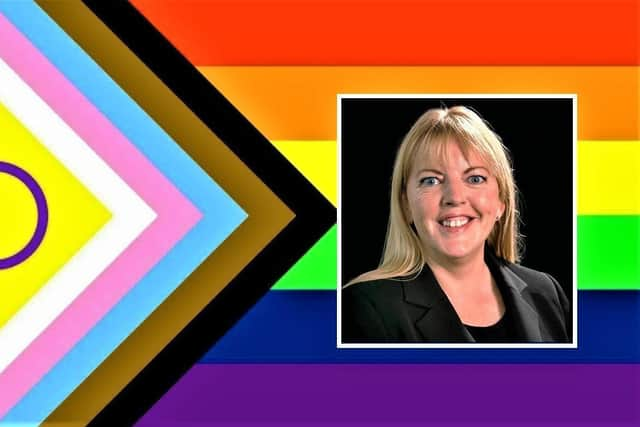WATCH: Differing opinions on ‘transphobia’ and ‘conversion therapy’ are ‘problematic’ within Northern Ireland Human Rights Commission says chief Alyson Kilpatrick at pride 2022 event
and live on Freeview channel 276
Alyson Kilpatrick also indicated that Christian groups to which LGBTQ+ activists object should not be invited into schools, adding that she is “investigating... the scale of the problem”.
She made the comments at a public meeting on Monday, as part of a five-person panel discussion called “Pride Talks Back”.
Advertisement
Hide AdAdvertisement
Hide AdShe appeared alongside Equality Commission boss Geraldine McGahey, Chief Constable Simon Byrne, NI Public Services Ombudsman Margaret Kelly, and Sinn Fein communities minister Deirdre Hargey, with the BBC’s William Crawley hosting the debate before a roomful of LGBTQ+ activists in Belfast.


Ms Kilpatrick, a barrister, took up the £75,000-a-year role of head of the government-funded NI Human Rights Commission last autumn, replacing Les Allamby who had held the post for seven years.
According to her NIHRC biography, among the cases she worked on as a lawyer was one about the rights of “a transgender child to medical treatment”.
‘I FIND DIFFERENCE IN VIEWS TO BE PROBLEMATIC’:
Speaking during the panel discussion, much of which did not focus on gay issues but on transgender ones, she said: “[T]here are a lot of people who are human rights champions who also are transphobic and homophobic, and I’m seeing that even within the human rights sector...
Advertisement
Hide AdAdvertisement
Hide Ad“I see it everywhere. I see it everywhere with other organisations. I see it less so in ours, thankfully, because we’re very careful and I’ve [kept a] very watchful eye on it.
“But I do see it. It can be an afterthought. If we’re doing a piece of advice on legislation someone will say have we actually thought about what this means for LGBTQ? And we say ‘actually no we haven’t’.
“Now, that should not be the case. We should have this through everything we do, but we don’t.
“Also in discussions on the board of the commission we have conversations that I’m not entirely comfortable about. You know so unless I can recognise that in my own pro-human rights organisation...”
Advertisement
Hide AdAdvertisement
Hide AdWilliam Crawley: “What kind of things are being said at your board?”
Alyson Kilpatrick: “Well, things that I don’t welcome, that aren’t entirely supportive...”
WC: “Board members?”
AK: “...that are questioning of... I didn’t say that. Not necessarily. But questioning of homophobia, transphobia, conversion therapy - we’ve debates about things like that, and there’ll be a difference in views.
“I find difference in views to be problematic. I know it’s welcome to have different views but I think if you’re a pro-human rights organisation you have to be for human rights...
WC: “Wow.”
Advertisement
Hide AdAdvertisement
Hide AdAK: “...and people have human rights whether they’re lesbian gay bisexual or anything else.”
WC: “That’s very honest. Thank you very much. I appreciate that.”
‘THERE’S A FIXATION THAT ONLY PARENTS CAN DECIDE WHAT CHILDREN GET TAUGHT...’
Ms Kilpatrick (who at one point during the talk declared “I don’t believe in a god necessarily”) was asked about Christian input in schools.
Advertisement
Hide AdAdvertisement
Hide AdShe said that “the commission has launched an investigation into relationships and sexuality education in post-primary schools” – something which is currently a major area of focus for gender activists.
William Crawley said: “What’s the status of perhaps a fundamentalist Christian group that might come into a primary school or a secondary school, invited in by the headmaster, the principal, and they deliver some kind of program which most people in this room would regard as transphobic or homophobic? What is the status?
“How can that be permissable?”
AK: “That’s what we’re investigating.”
WC: “It’s legal is it?”
AK: “It’s not illegal, can I put it that way? At the minute. We’re looking at it. We’re trying to identify the scale of the problem.”
WC: “Do you think it should be illegal?”
AK: “It is happening.”
WC: “It is happening, yeah.”
AK: “It shouldn’t be happening. It’s within the gift of the department and also...”
Advertisement
Hide AdAdvertisement
Hide AdWC: “So the department could shut it down but it’s not illegal...?”
AK: “The department is responsible for who educates children in NI.
“There’s a fixation in NI that only parents can decide what children get taught and this is one of those areas. So we will have to bring out a report.”